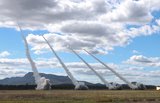Australia looks towards space with force restructure, investment and training
Australia is looking to improve its presence in space with a focus on communications and creating a dedicated segment of its defence forces committed to the domain.
General Dynamics has announced that it has been awarded two contracts by the US Army to develop and implement fixed and mobile cloud computing capacity for the Area Processing Centres Army Private Cloud (APC2) initiative. These five-year, multiple-award, indefinite delivery, indefinite quantity contracts, announced 2 April 2012, have a combined potential value of $249.8 million to all awardees.
Under the fixed Suite of APC2, General Dynamics will establish a secure, reliable and cost-efficient managed service cloud computing platform. Under the mobile Suite of APC2, General Dynamics will provide a mobile data centre solution to meet urgent army needs in contingency operations or where rapid or temporary computing is critical. In addition to providing strategic cloud computing direction, General Dynamics will manage network connectivity, information assurance, certification and accreditation, application migration, private cloud operations and maintenance and related aspects of the supply chain. The company will incorporate its field-proven design to deliver reliable, secure and transportable mobile data centres suitable for harsh conditions and remote locations.
APC2 is a new component of the LandWarNet strategic initiative, which encompasses all army information capabilities such as collecting, processing and storing information for warfighters. Through this programme, the army plans to lower application migration, hosting, administration and maintenance costs by moving to cloud computing and reducing the number of data centres it operates.
The General Dynamics team supporting this contract owns and operates more than 200 data centres in 23 countries and has successfully fielded more than 6,000 tactical shelters and containerised systems for the Army.

Australia is looking to improve its presence in space with a focus on communications and creating a dedicated segment of its defence forces committed to the domain.

The Portuguese company’s naval communications system is in service across more than a dozen countries. It has turned to its home nation for support in developing a new vehicle based C2 system.

The Vision4ce Deep Embedded Feature Tracking (DEFT) technology software is designed to process video and images by blending traditional computer vision with artificial intelligence (AI) algorithms to present actionable information from complex environments.

Persistent Systems has been cleared by National Security Agency (NSA) to transmit sensitive data on commercial networks. The devices are added to the NSA’s Commercial Solutions for Classified (CSfC) component list which also includes other companies’ products providing the same security.

The release of the UK’s Strategic Defence Review (SDR) has been long promised as mid-year. It is possible it could be as early as 2 June although the UK Ministry of Defence (MoD) continues to play its cards close to its chest.

Intelsat outlines how its multi-orbit SATCOM architecture is enhancing connectivity and resilience for special operations forces operating in degraded and contested environments.